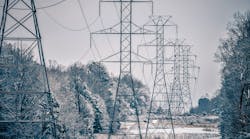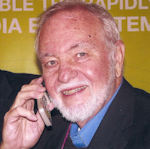That weakness noted in the headline is the U.S. electrical grid. And surely the Texas electrical grid. After a horrible week of unusually cold weather recently here in Texas, it became clear to me and many others that our electrical generation and distribution systems in this country are dated and no longer have the capacity to deal with the future. Double ditto for Texas.
I don’t usually comment on topics like this, but when I experienced the full brunt of not having electricity for a week, I felt I should chime in. As the brutal winter storms hit Texas, almost everyone experienced loss of power, some for a day or so, many others got rolling blackouts, and more than a few of us who were without power for a week. Without power means more problems for some than others.
In my case, loss of power means no heat and no water. The well will not pump without power. So, we endured for a few days sleeping in our clothes in 38- to 40-degree temperatures indoors. We finally gave up and moved to a hotel. By the way, finding a hotel with power and water wasn’t an easy task. Anyway, I will not dwell on it. But clearly the lack of sufficient power to serve the state was a major part of the misery.
Interestingly, Texas has its own electrical grid and most of it apparently not connected to the other U.S. grids. So, no outside help was possible, as I understand it. The Texas system is run by the Electric Reliability Council of Texas (ERCOT). This non-profit organization is usually reliable. But like most Texans, ERCOT wasn’t prepared for the rare frigid weather. ERCOT didn’t have the capacity to deal with it, and the weather really gave the state a heads-up about the grid.
One of the problems was failure of some of the alternative-energy generating sources. Texas in its efforts to become “greener” built out a huge wind system. Almost 25% of the state’s the generating capacity is wind. However, the weather really brought many of those generators down with ice.
One rumor I was unable to confirm is that despite the availability of winterizing and ice protection, this wasn’t purchased to save money. Besides, the general opinion of the powers-that-be was Texas could never get that cold. I also think that the deregulation of the electrical utilities not too long ago had a hand in it.
On top of that, what little solar ERCOT has available (3.8% of total capability) was also mostly unusable with snow covering the panels and other equipment frozen. Most of Texas uses natural gas. It’s cheap and reliable. So is coal, which is still used. As it turned out, Texas’s only nuclear plant was down for maintenance. So, many are rethinking the alternative-energy approach. We all love those alternate-energy sources, but they can never totally fulfill the power needs of our growing nation. We need all of our energy sources for greater reliability and independence.
Of course, everyone uses more electrical/electronic products each year. You EEs design for low power now, but the sheer volume of new electrical products overwhelms that effort. And we are on the path to more electric vehicles (EVs). These power-hungry mobile appliances will really test the electrical grids. If everyone is forced to have an EV and then plugs in to recharge at night, can the grids handle the load? Hopefully, someone has done the math on that. My guess is that we will be surprised at how much energy will be needed.
Wind and solar energy are great, and everyone approves. But together they can never totally supply what we use now or the increased usage to come. Maybe a solar panel or wind-generating field the size of Wyoming would do it.
The real solution, of course, is nuclear. But that will never happen. Too much opposition and regulation, unjustified as it is. Modern nuclear technology is better, cheaper, and safer than those older plants of the 1970s and 1980s.
Maybe a few more extreme weather experiences will help people and the governments to understand it all. It’s not that difficult. We have the technology to fix the problem with new and better generating sources and to fix our grids for increased reliability.
Finally, realize that our enemies see the possibility of conquering us by just bringing down the U.S. grid. Our over-a-century-old systems are vulnerable in multiple ways. A few years back, a California substation was brought down with a high-power rifle at a distance as it shot out a major transformer. Those transformers are mostly not protected. And replacing one is a major expense and delay. Not many of those transformers are available “off-the-shelf” the next day. Talk about vulnerable.
And I should remind you that a major solar event or an electromagnetic pulse (EMP) from a small nuclear explosion would pretty much shut the nation down for decades. Luckily, the earth’s magnetic field mostly protects us from the solar danger, but we would be wiped out by a big EMP.
Anyway, there’s more to it than just a bunch of us Texans sleeping and freezing in the dark for a week with no heat or water. It appears to be a national problem.

